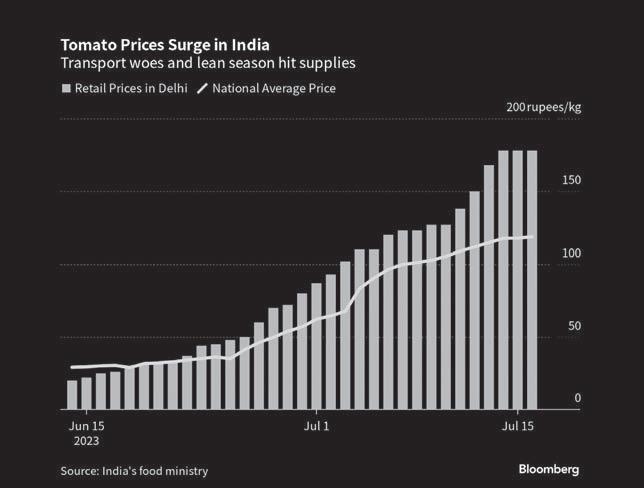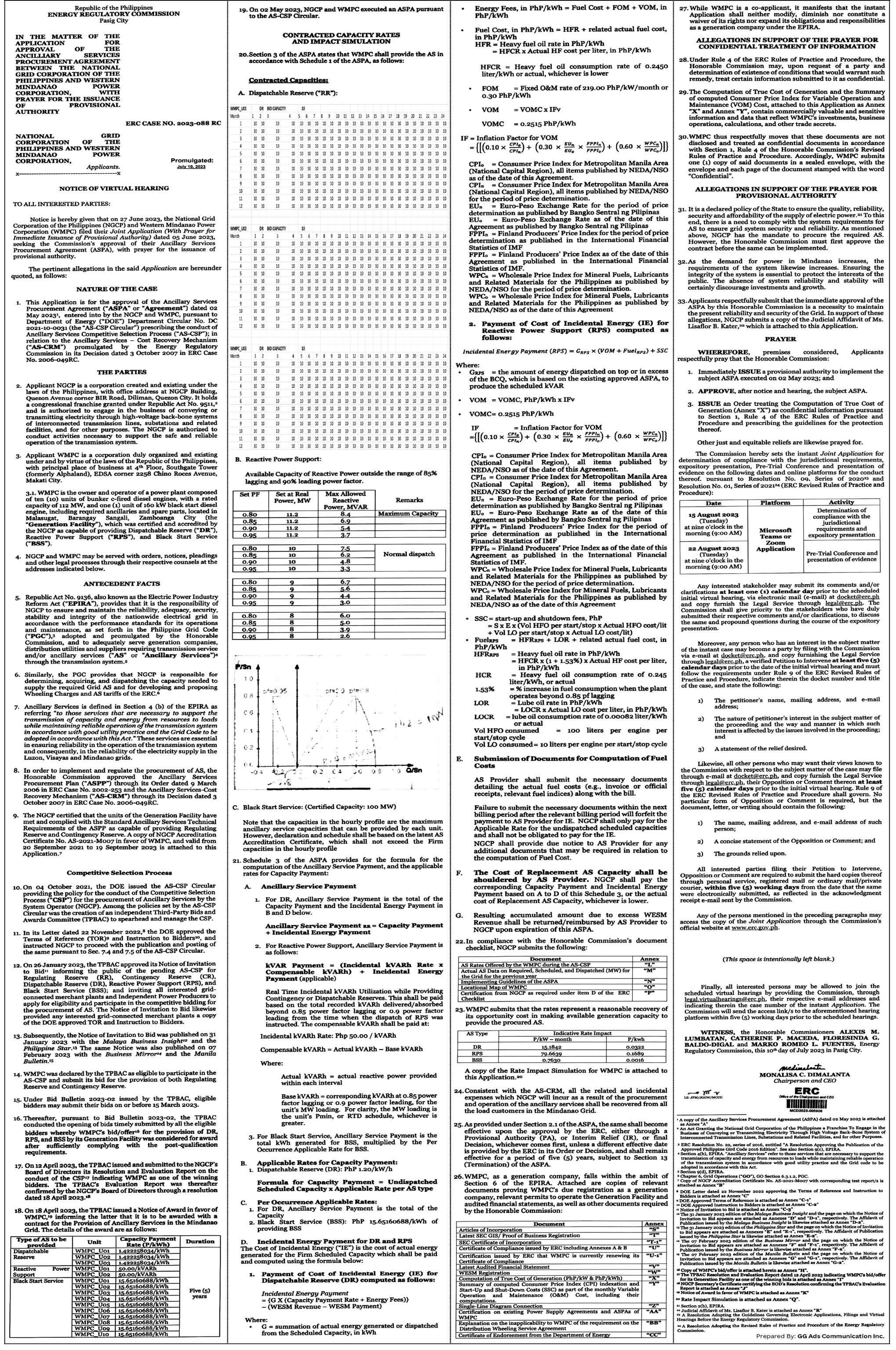
5 minute read
jump in tomato prices gives windfall to India farmers
AN eightfold surge in tomato prices is making some Indian farmers rich, although their windfall gains may be short-lived due to a likely rise in supplies in the coming weeks.
Retail prices of tomatoes were at 178 rupees ($2.20) a kilogram in Delhi on Sunday, a jump of more than 700 percent from January 1, according to data compiled by the food ministry. The national average was almost 120 rupees that day.
The hike, caused by heavy rains disrupting supplies, has hit consumer nerves, with many households temporarily forgoing tomatoes— an essential element of mainstay Indian dishes. But growers are elated.
Ishwar Gaykar said he and his wife Sonali, who grow tomatoes on 12 acres (4.9 hectares) of land near Junnar in the western state of Maharashtra, have made a profit of about 24 million rupees so far in the current season, compared with 1.5 million a year earlier.
The couple, who employ 60 to 70 daily workers to manage the fields, have emerged as one of the biggest suppliers of tomatoes in the region. Ishwar has gained celebrity status as local media outlets are lining up for interviews.
“About one and a half months ago, tomatoes were fetching barely 2.5 rupees a kilogram,” said Ishwar, who suffered a loss of about 2 million rupees in the same season of 2021. “Supply is thin, while demand remains strong.”
The couple have supplied about 350 tons in recent weeks, and expect to sell another 150 tons soon, provided the weather condition doesn’t deteriorate. They reap three harvests every year, with the current crop being 120 to 140 days old.
Supplies have been hit by transport disruptions following heavy monsoon rains and floods in some regions, and inflation is set to increase as other vegetables have also become more expensive. The issue has become front-page news, and is being hotly debated on social media, with consumers blaming the rain god and the authorities alike for the situation.
The government has started selling tomatoes at subsidized rates at many locations, deploying mobile vans. It’s showing some impact, but prices are still very high for consumers in a country of 1.4 billion people. Tomatoes generally cost more in the rainy months of July and August, but the spike has been unusual this year.
While prices are expected to fall in the coming weeks with an improvement in truck movements, growers are rejoicing in their current good fortunes.
“I have never seen my produce getting this high a rate,” said Mahendra Nikam, whose tomatoes fetched as much as 130 rupees per kilogram in Surat, a city in the state of Gujarat.
“Less than two months ago, farmers were literally forced to throw away tomatoes or feed the fruit-bearing plants to the cattle.”
Deepak Chavan, a Pune-based independent analyst, said that nurseries were witnessing a big demand for tomato plants because of the recent surge in prices. “No doubt this is a short-lived fortune, but I won’t be surprised if we witness a glut-like situation in September,” he said.
Britain’s food inflation
FOOD inflation in Britain appears to be past its worst after producers and grocers cut prices and raw material costs stabilize or come down.
In the first sign that the country’s lengthy cost-of-living crisis could be easing, grocery price inflation dropped 1.6 percentage points to 14.9 percent in the four weeks to July 9, according to market research firm Kantar. That’s down from a high of 17.5 percent in March.
Food and drink manufacturers cut their prices in June for the first time in three years, according to Lloyds Banking Group.
The reduction will come as a relief for households struggling with their budgets, although there could still be a time lag before a positive effect is seen as rising interest rates continue to bump up mortgage costs and inflation remains more than four times its target at 8.7 percent.
Britain is “definitely over the worst” of food price inflation, according to Tim Steiner, CEO of online grocer Ocado Group Plc. Still, he warned Tuesday that until interest rates steady, there will be pressure on home loans and wage demands.
“We need to see interest rates ideally stabilize and come down before I think we can start to see this inflation actually start to go back down,” said the former Goldman Sachs Group Inc. banker.
Steiner said grocers haven’t been profiteering from inflation, an allegation made by some Members of Parliament.
“When there’s excess demand for toilet paper or water, the grocers ration it,” he said. “As opposed to when there’s more demand for taxis or theater tickets or airline tickets, they just put the price up and take the profit.”
Ocado has been reducing prices on more than 100 products from branded goods such as Lurpak garlic butter to salmon fillets and avocados. All the big grocers have been doing the same and frozen food specialist Iceland Foods announced price cuts Tuesday on 500 essential household products. Deals include £2 for 15-piece packs of fish fingers and £3.60 chicken-breast fillets.
The Kantar survey showed that more than a quarter of sales in the four-week period were made through promotions as shoppers try to save money. Retailers are shifting efforts from everyday low pricing, including on store-brand products, to loyalty programs such as Tesco Plc’s Clubcard or J Sainsbury Plc’s Nectar card.
The search for cheaper prices means discount grocer Aldi was again the fastestexpanding retailer, with sales up by 24 percent, while Lidl recorded a 22-percent annual jump in sales. Bloomberg News
PALAWAN Governor Victorino Dennis M. Socrates led the launching of KADIWA ng Pangulo (KNP) 2023 in the province wherein local agricultural products such as fresh and nutritious vegetables, fruits, poultry, nuts and dried products, rice, and groceries were made available at affordable prices. The launching held at the Centennial Pavilion of the Provincial Capitol, Puerto Princesa City last July 17, 2023 was spearheaded by the Office of the Provincial Agriculturist (OPA), in partnership with the Palawan Tarabidan Multipurpose Cooperative as the official “Katuwang sa Diwa at Gawa para sa Masaganang Ani at Kita” or KADIWA partner in Palawan, Department of Agriculture (DA), Department of Trade and Industry (DTI) Palawan, National Food Authority (NFA), Department of the Interior and Local Government (DILG) and NCCC Mall Palawan. In his message, Socrates expressed his appreciation for the project which aims to help local producers earn higher income by eliminating intermediaries and, at the same time, allow consumers to buy agricultural products and other goods at a lower price.
“Thank you for this project sapagkat alam natin na maraming makikinabang dito, matutulungan ang ating mga producers at ganun din ang ating mga consumers sa pamamagitan ng mabibiling pangangailangang pagkain at basic necessities sa murang halaga,” he said in a statement.
According to Provincial Agriculturist Romeo Cabungcal, aside from having these basic commodities accessible and affordable to the poor, the project also provide farmers, fisherfolks and micro-enterprises a rent-free venue to sell their products and increase their income.
The activity also coincides with the nutrition month celebration this July with the theme “Healthy diet, gawing affordable for all!” In her message, Provincial Nutrition Action Officer Rachel Paladan conveyed the significance of the project in addressing the problem of malnutrition in the province.
“Ito pong KADIWA ay sagot po sa ating problema sa malnutrisyon suportahan po natin ang mga local produce ng ating mga farmers kasi nakikita po natin na masustansiya at sariwa tapos dito lang po natin mabibili na affordable po sa lahat.”
Meanwhile, the nationwide launching of KNP was held at San Fernando City, Pampanga and participated simultaneously by all provinces in the country.










